“Isn’t that the vegan restaurant?”
That’s the usual reply I get when I bring up Fat Choy, and you wouldn’t be totally wrong to ask that. Fat Choy is a vegan restaurant. But it’s also much, much more than that.
At Fat Choy in Englewood, NJ, Chef Justin Lee crafts an exceptional dining experience that traverses the many flavors and techniques of Chinese cooking—from playful, veggie-forward riffs on Cantonese dishes to reinvented Chinese-American take-out staples.
Fat Choy: Kind of Chinese, Also Vegan
It’s an overcast afternoon with sporadic bursts of 10-minute rain showers as I tuck into Fat Choy for a bite (or several) to eat. Chef Justin Lee takes me through the menu one by one. “Spring rolls are a must. Get the mushrooms. People like these noodles a lot, but I prefer these,” Lee says as he firmly points at items across the entirety of the Fat Choy menu.
The teal-accented booths and matching dragons painted across the blank white walls beckon guests to come into Fat Choy. Each table is adorned with red chopsticks and traditional paper placemats that double as an infographic on the Chinese Zodiac; paper lanterns hang from the ceiling and there’s a picture of Bruce Lee, who Chef Lee jokingly calls his cousin, in nearly every corner. Fat Choy is a restaurant that, by design alone, begs you to give it a shot.
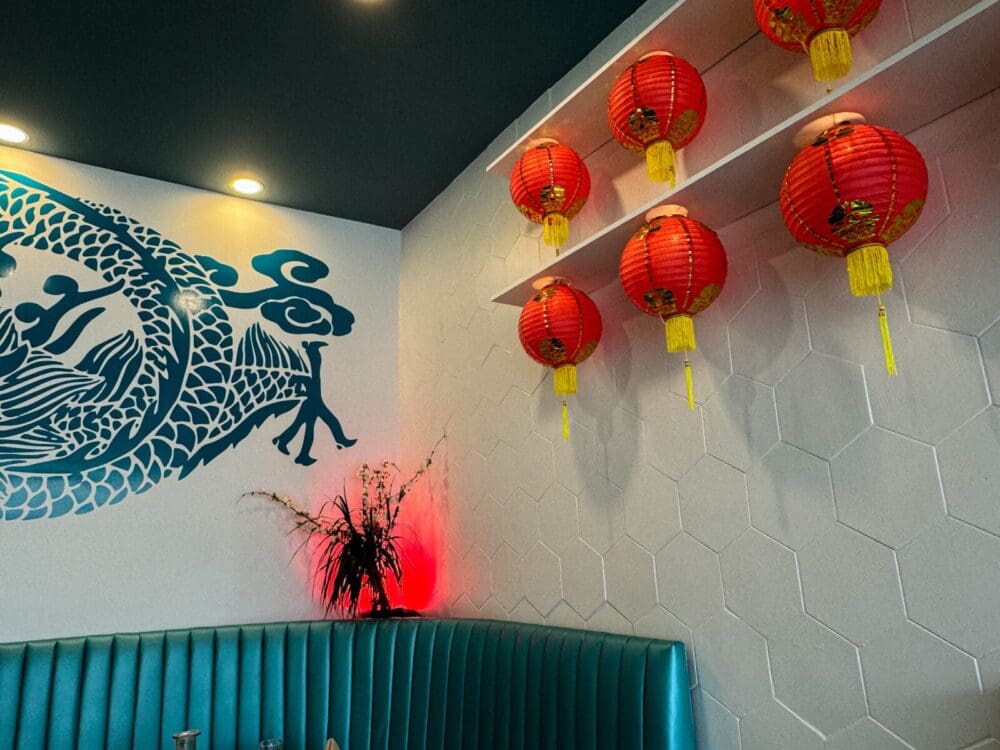
Fat Choy’s dining room
The vegan aspect is something Chef Lee—who does not practice veganism himself—doesn’t spend all too much time thinking about. For him, he’s just cooking food that happens to be vegan. However, it is something he saw as a necessity for general health and environmental concerns when he opened the original Fat Choy in the Lower East Side back in 2020. Lee closed the doors to the LES location in 2022 despite positive reviews before coming across the Hudson River and settling in Englewood. Many would say that Fat Choy got even better when it came to The Garden State with an expanded menu and space. Since moving, the New York Times named Fat Choy one of America’s best restaurants of 2023.
“To be honest, I planned on leaving the restaurant industry as a whole,” he tells me, “I even started doing an online Masters. I wanted to be a P.E. teacher.” That was until Jonathan Krieger gave him a ring and asked Lee to bring the Fat Choy concept to Englewood.
It was practically set up on a tee for Chef Lee, who cites Englewood’s large Kosher community as a huge part of his customer base (Fat Choy is also certified Kosher). “A majority of our base isn’t even vegan,” says Lee. “For my wife and I, we want to have kids one day. For the sake of the environment and my future children, I felt this was necessary.” Along with Krieger, the duo opened their doors in August of last year. Just like that, the NJ dining landscape was changed for good.
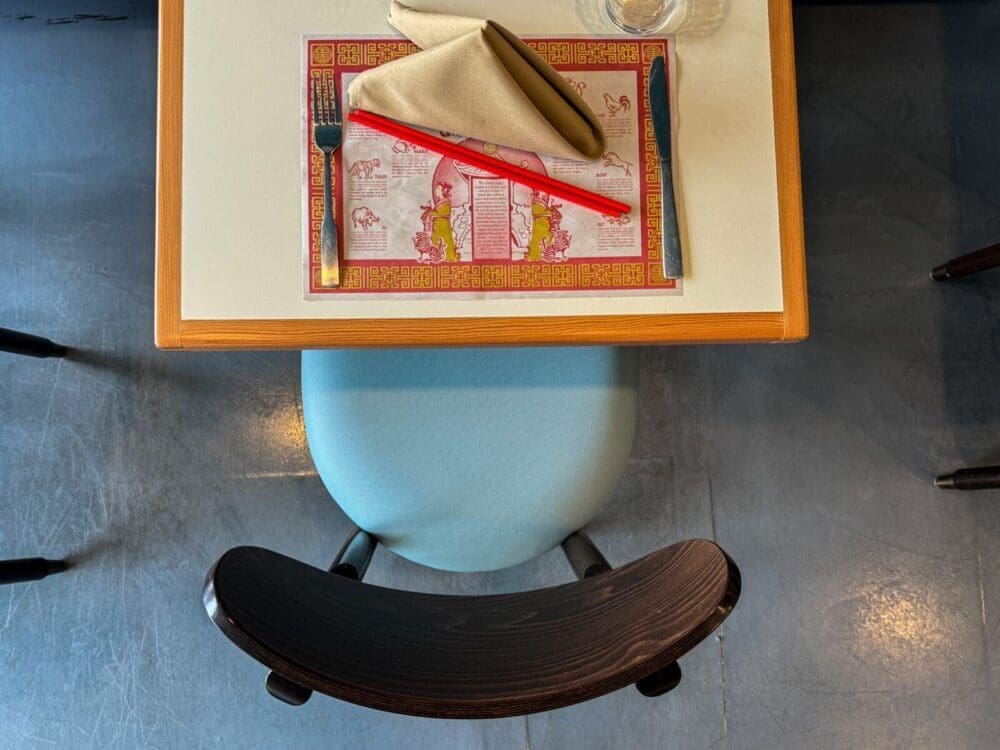
A table setting doubles as a lesson on the Chinese Zodiac
Lee’s environmental concerns extend to the products he uses, too. Fat Choy is currently in a transition phase from olive oil as the primary cooking fat to Zero Acre Oil—a neutral and sustainable oil derived entirely from sugar cane. Because of sugar cane’s innate ability to grow with very little water or space, it becomes a perfect candidate for an all-purpose oil that is both healthy and sustainable.
All of this adds up to make Fat Choy what it is: a Chinese diner of sorts. It’s a place where a solo guest can tuck into for a quick plate of lo mein and maybe a mushroom sloppy joe on their lunch break, or large groups can gather for a spread of General Tso-inspired cauliflower, Kung Pao tater tots with tofu, spring rolls and more. “For me, Chinese food has always been a shared experience, but we want to be a place where someone can freely dine on their own, too,” Lee stated. “I just want to make good food that’s accessible.”
You Won’t Be Missing a Thing At Fat Choy
To no one’s surprise, Fat Choy’s menu backs up the bold concept with ease. Diners are delighted by complexly flavored dishes that—when broken down to their parts—are often very simple.
Take the smashed cucumber salad, for example. Lee takes cut cucumber and whacks it with the back of his knife to create divots for a silky sesame dressing to live in. A zingy leopard vinaigrette coats each cucumber spear, while a dusting of toasted sesame seeds brings a nutty aroma along with crunch to the party. So simple. The perfect bite to start a meal off with.
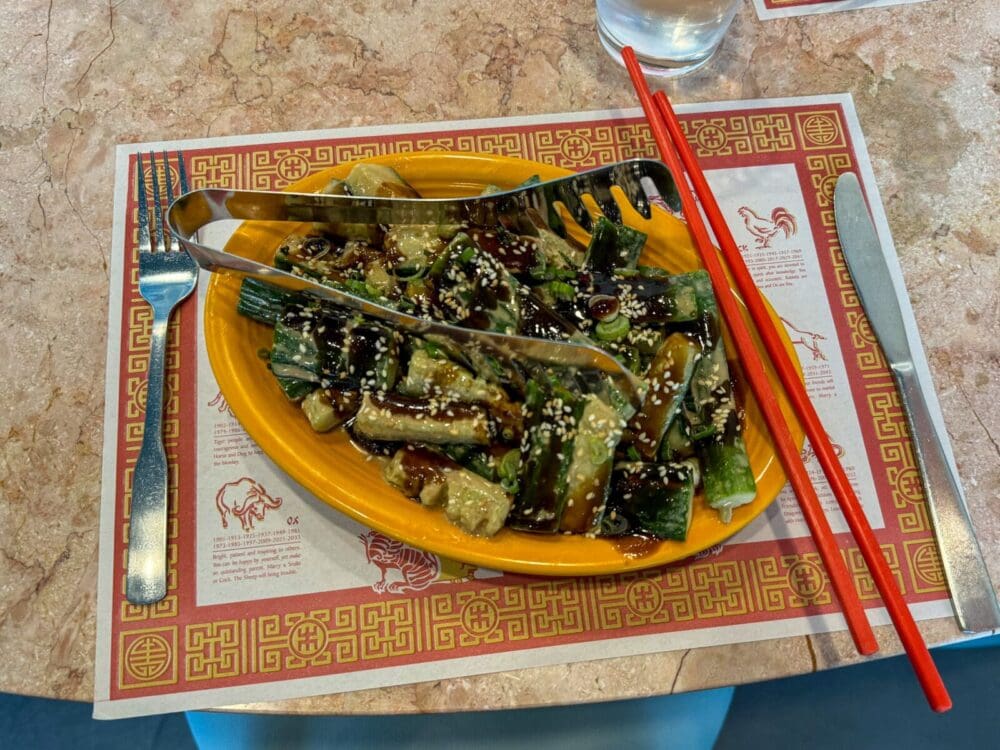
Smashed cucumber salad
Chef Lee also prepared for us his play on BBQ bao buns, featuring a char siu-style roasted trumpet mushroom and a cabbage slaw. The mushroom was sweet with a deep-roasted flavor and an undeniably bouncy texture—cut through by the crisp and bright slaw. All of this ties together beautifully in between the fluffy, steamed bun. I found this bao to be even better with a touch of Fat Choy’s housemade hot sauce, which is made by blending the solids leftover from their chili oil along with Chiltepin chili. It makes for something boldly spicy—“in your face,” some might call it. A little goes a long way as Chiltepin is around 40 times spicier than jalapeno. The best part about this hot sauce, though, is that it is yet another zero-waste product. In most restaurants, the solids leftover from chili oil go into the bin, at Fat Choy, they get a second life.
The star of the Fat Choy appetizers might just be the Lower East Side Spring Rolls, which are an homage to two inherent parts of LES: Chinese food and Katz’s Deli. Tangy sauerkraut is wrapped in a thin spring roll wrapper and fried to a golden-brown shade. On the side, a house-made “reuben” sauce, which is, of course, vegan. Lee accomplishes this feat by blending pastrami spices, caraway, ketchup, mustard, chopped pickles, and tofu to create a creamy texture. “We use tofu for a lot of our sauces here,” Chef Lee told me. “It’s the easiest way to get that creamy texture you’d find in mayonnaise-based sauces.”
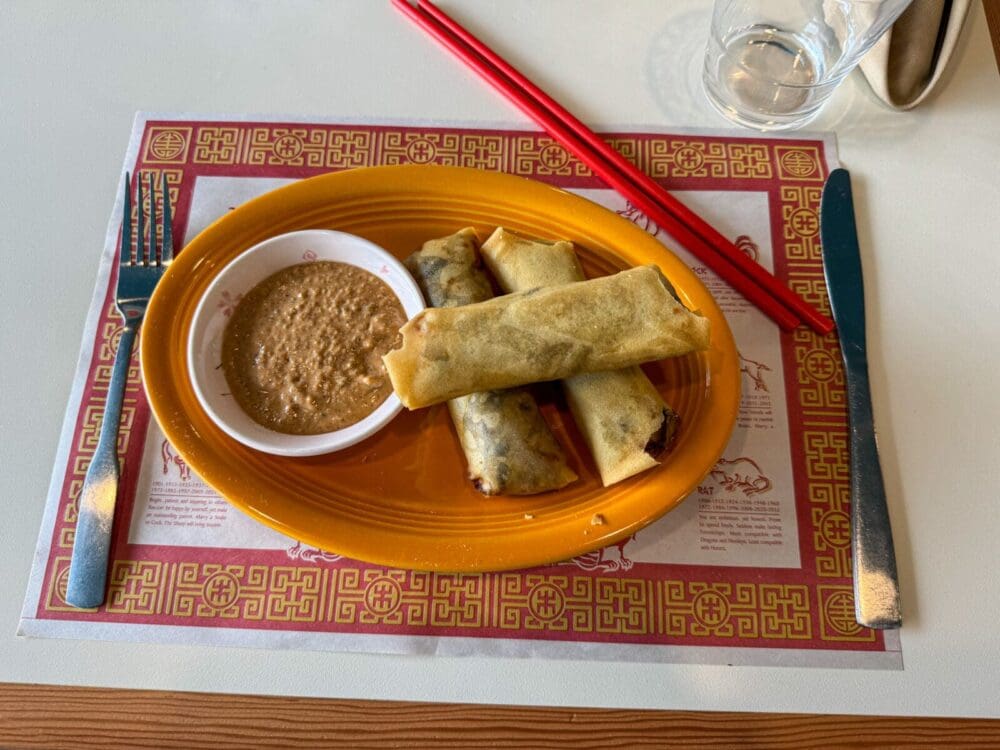
Lower East Side spring rolls with “reuben” sauce to dip
I won’t lie, I was skeptical of this dish as a whole. Would the spring roll fall flat? Would the reuben sauce live up to the OG? I’m happy to admit that Lee made me a fool. These were addictingly good. One bite of the shatteringly crisp spring roll with its sharp filling and creamy sauce and I was hooked. The Lower East Side Spring Rolls went from something I looked right past, to a staple order in the blink of an eye.
Dishes like General Lee’s cauliflower can be seen as safe options for those skeptical of vegan food as a whole, but don’t get it twisted: I’d choose this over many versions of the “real thing.” Chunks of cauliflower are battered and fried, tossed in a sticky sauce right out of the fryer. The sweet sauce brings a slight heat along for the ride as well as a punch of acidity. The enigma of it all is that, at least to me, the dish got better and better as it sat. I even found myself eating the leftovers straight from the box as I sat in traffic on my drive home. Is it a no-brainer for Lee’s menu? Absolutely. And there is nothing wrong with that.
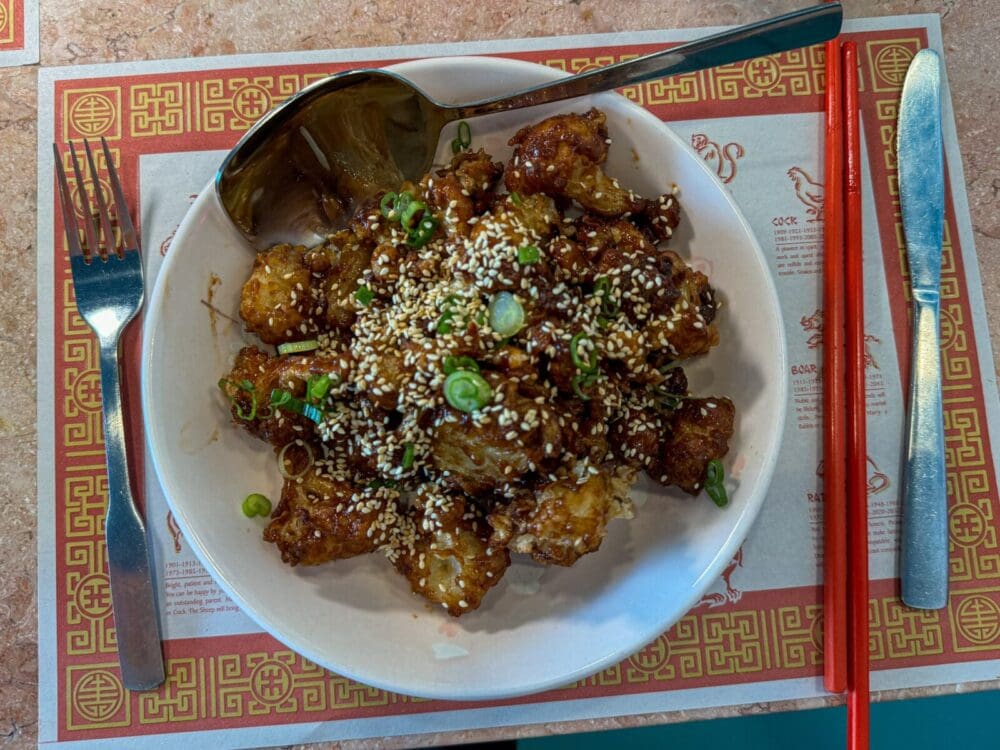
Is the General Lee cauliflower a no-brainer? Sure. Is it excellent? Absolutely.
I dream of Fat Choy’s crispy, spicy mushrooms— another item that Chef Lee insisted I try. He explained to me that it was actually a play on the crispy shredded beef you might find on some Chinese food menus. “I remember going to a friend’s house as a kid and his family ordered this crispy beef that I had never had before from their favorite takeout spot. I never stopped thinking about it, and the mushrooms sort of became my ode to that dish,” Lee said. To achieve the same feel, he fries hon shimeji and oyster mushrooms to a crisp. Emphasis on crisp. Once fried, the mushrooms get tossed in a spicy caramel sauce that is as sweet as it is hot. The sauce goes expertly with the fried mushrooms, which Lee takes far enough to produce a resounding crunch. This dish has it all: it’s sweet, sour, salty, bitter and loaded with umami. These were without a doubt, one of the best bites I’ve had in 2024 so far.
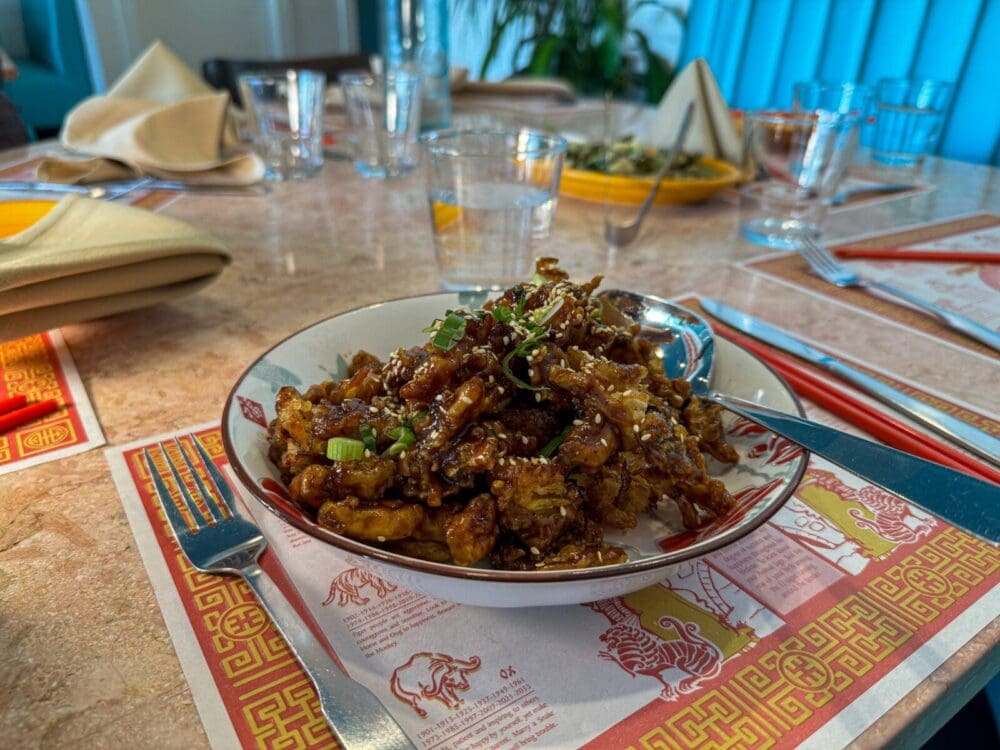
“One of the best bites I’ve had in 2024 so far.”
Despite not having wok burners in the Fat Choy kitchen, Lee has still managed to find a way to impart wok-hei (the smoky flavor and aroma found in wok-cooked dishes) into his food. He achieves this by infusing oil with, well, burnt aromatics. You see, when you cook in a wok, the flame is strong enough to come over the top and essentially scorch any droplets of oil or sugar that might be present in the food. This is why when you get fried rice at Chinese restaurants, you’ll often see the slightest char marks on the onion. It might seem minimal, but it actually matters a lot. By infusing oil with these same flavors, Lee has found a way to season any dish that might call for wok-hei. This method is something I almost can’t believe he told me for free.
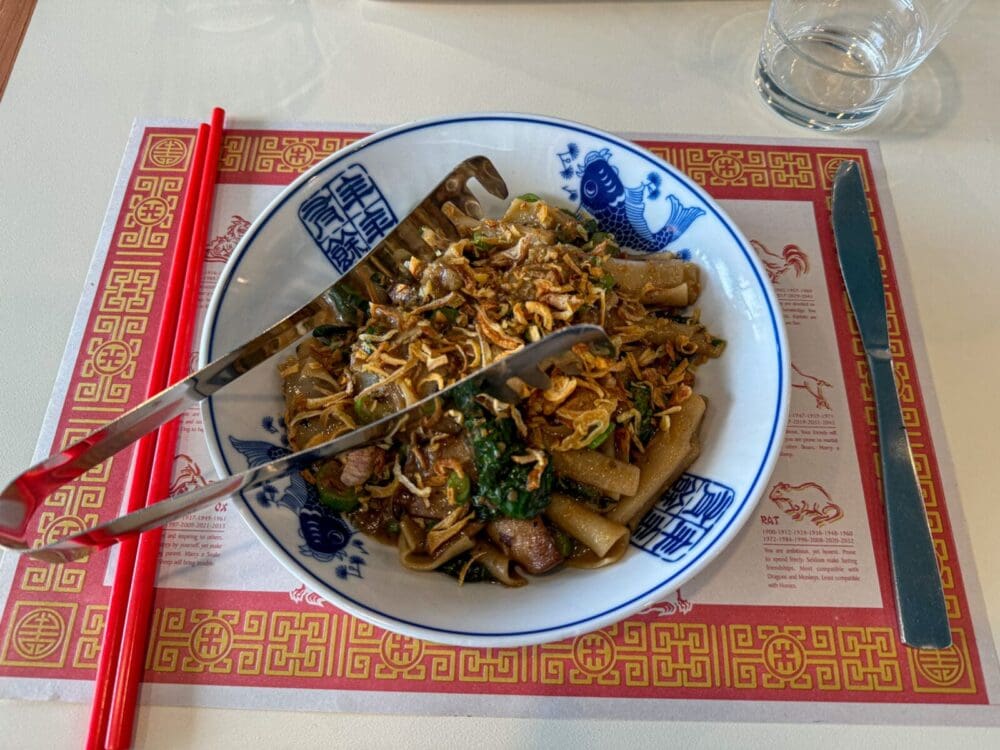
Wide rice noodles are bouncy in texture, bathed in a savory mushroom gravy
What would a Chinese diner be without noodles? You could go for the fan-favorite dirty lo-mein with mixed vegetables and a soy emulsion, or you could go for something like the wide rice noodles which come sauced in a mushroom gravy and studded with pieces of Chinese broccoli. The chewy texture of the rice noodles made the perfect complement for the savory and umami gravy. A handful of crispy fried shallots on top brings it all together.
I’m going to say it. If you’re searching for NJ’s best veggie burger, you can stop your search. It lives right here at Fat Choy. Lee’s unique method for his burger patty pulls inspiration from falafel for its structure. He starts by marinating potato, chickpea and mushroom in a (fish-free) XO sauce—a Southern Chinese sauce that is loaded with umami flavor—before grinding the flavored vegetables and legumes raw and forming it into patties. Then, rather than sear them off, he batters it and fries it. The mixture becomes encased in a thin shell of crisp batter, that helps to protect the filling from drying out in the same way tempura would. House burger sauce (hello blended tofu, we meet again), lettuce, onion, bread and butter pickles and a slice of Daiya dairy-free cheese top the burger, which comes housed inside a squishy, toasted sesame bun.
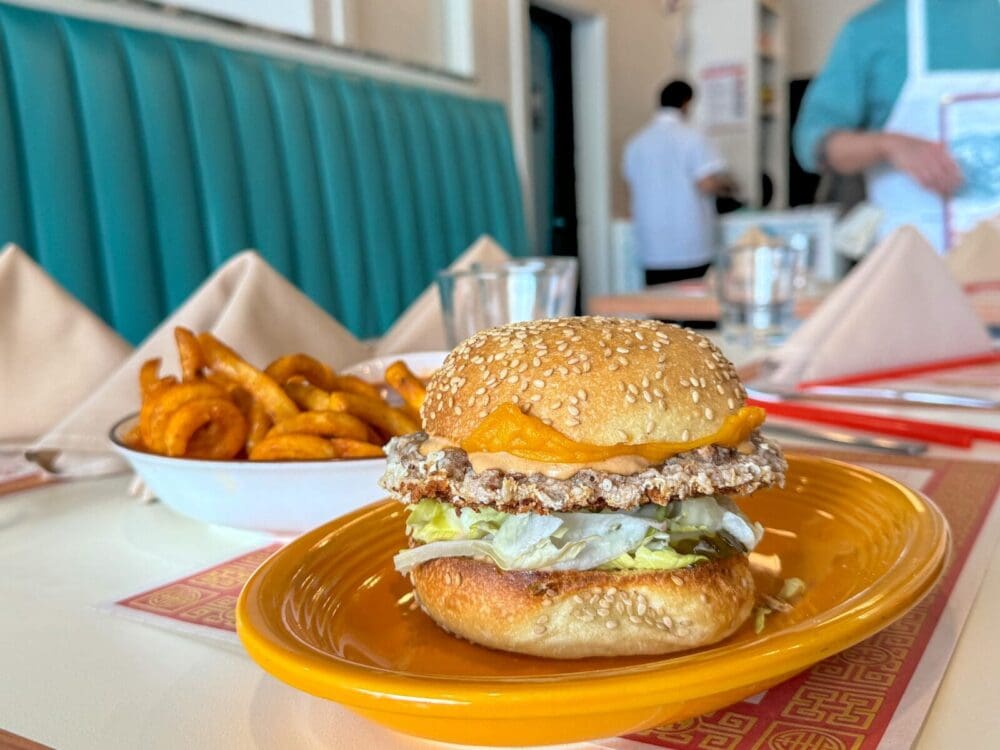
The best veggie burger in NJ is just that: a VEGGIE burger. Leave the fake meat to other places.
To go with the burger, I’d suggest an order of Sichuan curly fries. Typical, seasoned curly fries (the ones you can get at any Jersey diner) drizzled with spiced cumin oil right out of the fryer. The aromatic spice sticks to the exterior to create something magical. For dipping, a vibrant sweet and sour sauce, though I found myself using the house hot sauce just as much.
Never skip dessert. I never do and you shouldn’t either. And dessert is anything but an afterthought. The staple offering being the banana rangoon. Simple and delicious. Chunks of banana and dairy-free cream cheese, wrapped in wonton wrappers and fried to a crisp. What’s not to like? To top it off, a cinnamon-five-spice-laced caramel. I’d eat 100 if I had the room.
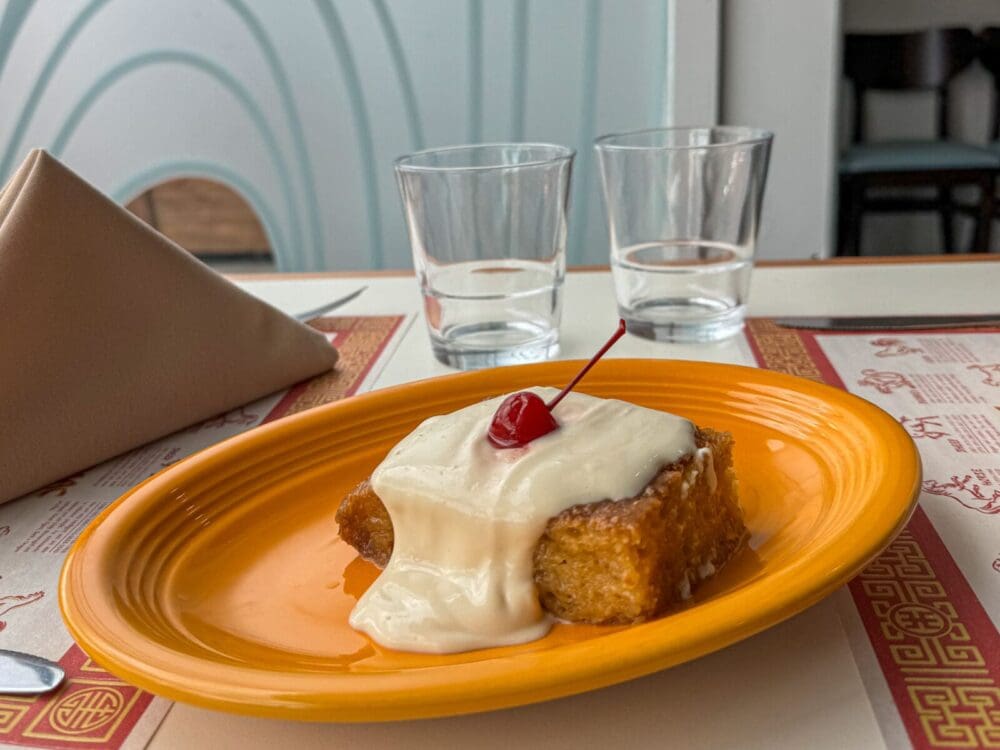
Fat Choy’s sweet potato cake with vanilla-miso custard
There was also an intriguing dessert dubbed “The Golden Phoenix Cake.” My curiosity got the best of me and I had to have it. Lee makes a sweet potato olive oil cake with a gluten-free flour mix containing rice, corn and tapioca flours. The spongy cake soaks in a vanilla-sweetened rice milk a la tres leches and comes topped with a generous slathering of vanilla-miso custard. A cherry on top for good measure.
Fat Choy Demands Your Attention. It’s that Good.
Fat Choy is so much more than just a vegan restaurant. Its Chinese diner concept spreads across the menu, bringing reliably good bites that don’t leave you missing a thing. It’s a project that demands your attention because, quite frankly, there isn’t another restaurant in New Jersey like it.
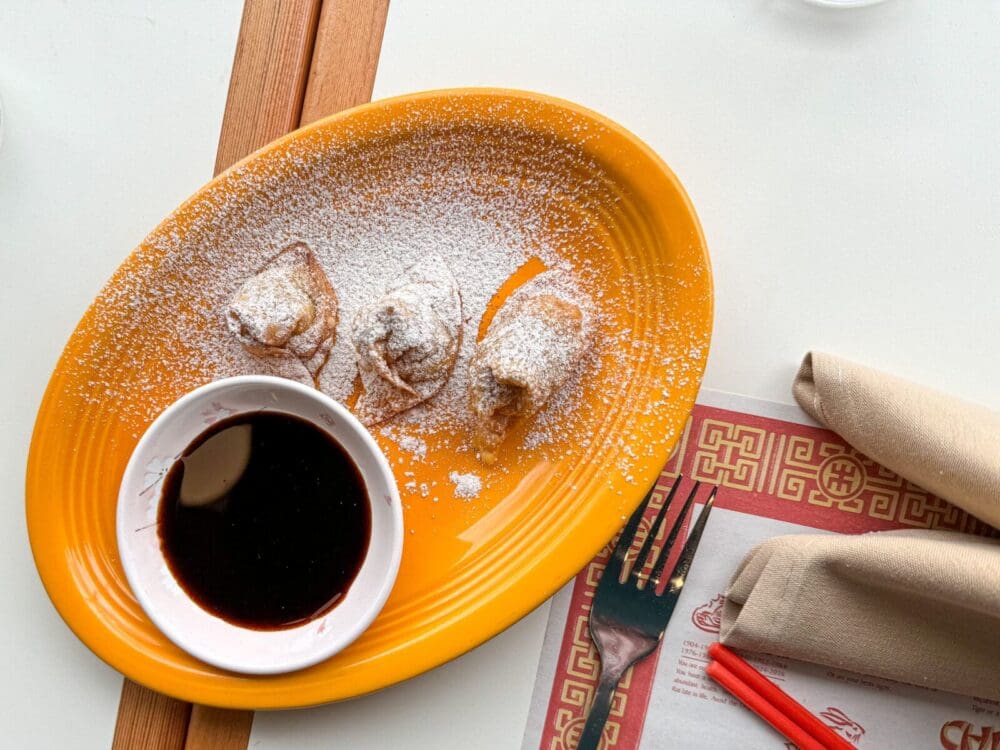
Banana rangoon
Whether it be the addictive nature of sweet and spicy mushrooms or the handheld convenience of NJ’s best veggie burger, Fat Choy’s menu deserves exploring. You’ll soon find it’s okay to step out of your comfort zone, as Chef Justin Lee’s creative ingenuity makes it simple to approach something unlike anything you’ve ever had. And that’s the magic: the bites are familiar enough to invoke nostalgia but unique enough to puzzle even the most experienced of eaters.
The food, the ambiance, the sustainable consciousness, the Bruce Lee wallpaper in the bathroom and so on—I can’t get enough. Add it all up and you get one of the most impressive dining experiences in New Jersey.
Oh yeah, it happens to be vegan, too.
About the Author/s
Peter Candia is the Food + Drink Editor at New Jersey Digest. A graduate of The Culinary Institute of America, Peter found a passion for writing midway through school and never looked back. He is a former line cook, server and bartender at top-rated restaurants in the tri-state area. In addition to food, Peter enjoys politics, music, sports and anything New Jersey.
